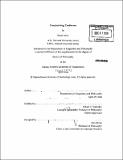| dc.contributor.advisor | Robert C. Stalnaker. | en_US |
| dc.contributor.author | Moss, Sarah (Sarah E.) | en_US |
| dc.contributor.other | Massachusetts Institute of Technology. Dept. of Linguistics and Philosophy. | en_US |
| dc.date.accessioned | 2010-05-27T14:13:05Z | |
| dc.date.available | 2010-05-27T14:13:05Z | |
| dc.date.copyright | 2009 | en_US |
| dc.date.issued | 2009 | en_US |
| dc.identifier.uri | http://hdl.handle.net/1721.1/55298 | |
| dc.description | Thesis (Ph. D.)--Massachusetts Institute of Technology, Dept. of Linguistics and Philosophy, 2009. | en_US |
| dc.description | Cataloged from PDF version of thesis. | en_US |
| dc.description | Includes bibliographical references (p. 101-108). | en_US |
| dc.description.abstract | This dissertation is about ways in which our rational credences are constrained: by norms governing our opinions about counterfactuals, by the opinions of other agents, and by our own previous opinions. In Chapter 1, I discuss ordinary language judgments about sequences of counterfactuals, and then discuss intuitions about norms governing our credence in counterfactuals. I argue that in both cases, a good theory of our judgments calls for a static semantics on which counterfactuals have substantive truth conditions, such as the variably strict conditional semantic theories given in STALNAKER 1968 and LEWIS 1973a. In particular, I demonstrate that given plausible assumptions, norms governing our credences about objective chances entail intuitive norms governing our opinions about counterfactuals. I argue that my pragmatic accounts of our intuitions dominate semantic theories given by VON FINTEL 2001, GILLIES 2007, and EDGINGTON 2008. In Chapter 2, I state constraints on what credence constitutes a perfect compromise between agents who have different credences in a proposition. It is sometimes taken for granted that disagreeing agents achieve a perfect compromise by splitting the difference in their credences. In this chapter, I develop and defend an alternative strategy for perfect compromise, according to which agents perfectly compromise by coordinating on the credences that they collectively most prefer, given their purely epistemic values. In Chapter 3, I say how your past credences should constrain your present credences. | en_US |
| dc.description.abstract | (cont.) In particular, I develop a procedure for rationally updating your credences in de se propositions, or sets of centered worlds. I argue that in forming an updated credence distribution, you must first use information you recall from your previous self to form a hypothetical credence distribution, and then change this hypothetical distribution to reflect information you have genuinely learned as time has passed. In making this proposal precise, I argue that your recalling information from your previous self resembles a familiar process: agents' gaining information from each other through ordinary communication. | en_US |
| dc.description.statementofresponsibility | by Sarah Moss. | en_US |
| dc.format.extent | 108 p. | en_US |
| dc.language.iso | eng | en_US |
| dc.publisher | Massachusetts Institute of Technology | en_US |
| dc.rights | M.I.T. theses are protected by
copyright. They may be viewed from this source for any purpose, but
reproduction or distribution in any format is prohibited without written
permission. See provided URL for inquiries about permission. | en_US |
| dc.rights.uri | http://dspace.mit.edu/handle/1721.1/7582 | en_US |
| dc.subject | Linguistics and Philosophy. | en_US |
| dc.title | Constraining credences | en_US |
| dc.type | Thesis | en_US |
| dc.description.degree | Ph.D. | en_US |
| dc.contributor.department | Massachusetts Institute of Technology. Department of Linguistics and Philosophy | |
| dc.identifier.oclc | 608248489 | en_US |
